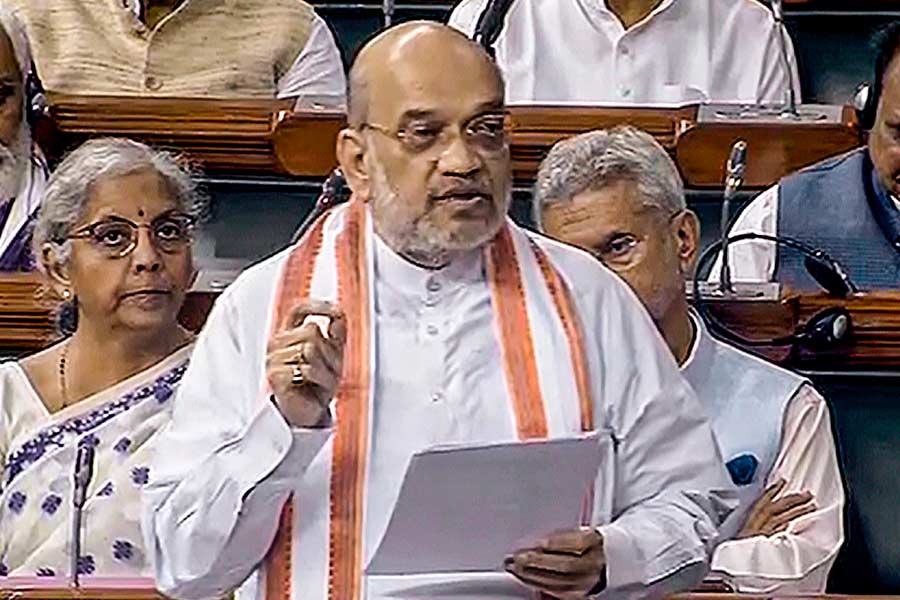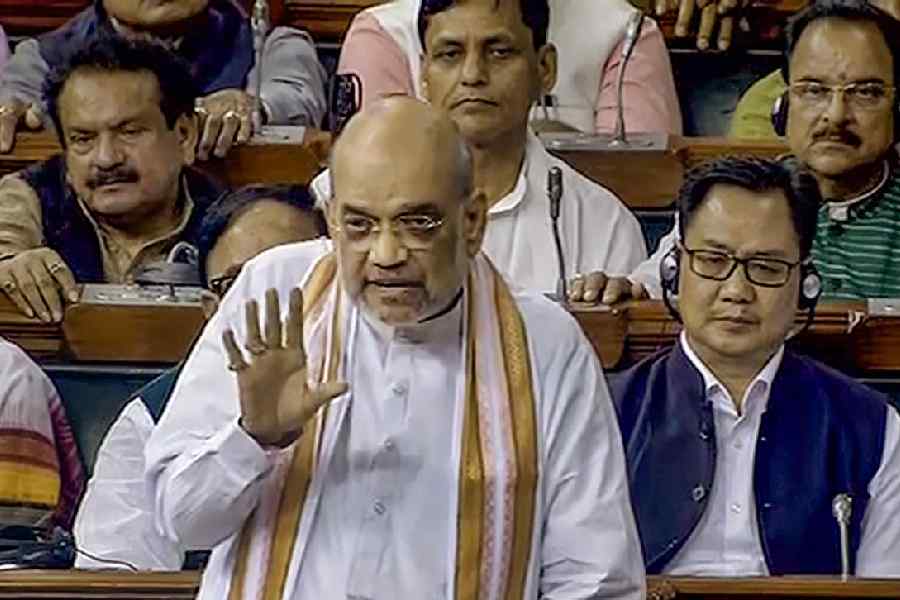The Narendra Modi government on Friday tabled three bills with the stated objective of overhauling colonial-era criminal laws. But the bills, if unchanged, could end up making the State a merciless and humourless monolith that brooks little dissent, brands protests acts of terror to crush them with an iron fist and cracks down hard on lampooning.
The bills seek to facilitate the death penalty for mob lynching and sexual assaults on minors and replace sedition with a new offence of “endangering the unity” of the country.
One of the bills aims at criminalising defamation, prompting some lawyers to accuse the government of trying to criminalise satire and dissent.
A sweeping definition of a “terrorist act” has also been mooted: “To cause damage or loss due to damage or destruction of property or disruption of any supplies or services essential to the life of the community, destruction of a government or public facility, public place or private property; to cause extensive interference with, damage or destruction to critical infrastructure.”
Unless safeguards or amendments are incorporated — the bills will now be reviewed by a select committee that has Opposition presence too — any street protest that spins out of control could be termed a “terrorist act”.
Introducing the bills, Union home minister Amit Shah said the Indian Penal Code (IPC) of 1860 would be replaced by the Bharatiya Nyaya Sanhita. The Bharatiya Nagarik Suraksha Sanhita will replace the Code of Criminal Procedure or the Criminal Procedure Code (CrPC) and the Bharatiya Sakshya will replace the Indian Evidence Act.
Unity law
Section 150 of the Bharatiya Nyaya Sanhita Bill looks like the successor to the sedition law.
“Whoever, purposely or knowingly, by words, either spoken or written, or by signs, or by visible representation, or by electronic communication or by use of financial means, or otherwise, excites or attempts to excite, secession or armed rebellion or subversive activities, or encourages feelings of separatist activities or endangers sovereignty or unity and integrity of India; or indulges in or commits any such act shall be punished with imprisonment for life or with imprisonment which may extend to seven years and shall also be liable to fine,” says Section 150 of the Bharatiya Nyaya Sanhita Bill.
The explanation of the provision says: “Comments expressing disapprobation of the measures, or administrative or other action of the government with a view to obtain their alteration by lawful means without exciting or attempting to excite the activities referred to in this section.”
Defamation
Section 354 says: “Whoever, by words either spoken or intended to be read, or by signs or by visible representations, makes or publishes in any manner, any imputation concerning any person intending to harm, or knowing or having reason to believe that such imputation will harm, the reputation of such person, is said, except in the cases hereinafter excepted, to defame that person.”
Explanation 1 says “it may amount to defamation to impute anything to a deceased person, if the imputation would harm the reputation of that person if living, and is intended to be hurtful to the feelings of his family or other near relatives”.
Explanation 2 says “it may amount to defamation to make an imputation concerning a company or an association or collection of persons as such”.
If the bills are passed, the explanations could mean that criticising ideologues who are no more and publishing articles that question business houses can invite action. Some critics were quick to ask if Prime Minister Narendra Modi would be able to continue his attacks on Jawaharlal Nehru, if the bills come into force.
Irony
The idiom “irony just died a thousand deaths” may ring truer too.
Explanation 3 says “an imputation in the form of an alternative or expressed ironically may amount to defamation”.
Exemptions have been put in place but some are so general in nature that self-styled aggrieved parties can claim a critical comment has lowered their “moral or intellectual character” in the estimation of others.
Explanation 4 says that “no imputation is said to harm a person’s reputation, unless that imputation directly or indirectly, in the estimation of others, lowers the moral or intellectual character of that person, or lowers the character of that person in respect of his caste or of his calling, or lowers the credit of that person, or causes it to be believed that the body of that person is in a loathsome state, or in a state generally considered as disgraceful”.
Home minister Shah said in the Lok Sabha: “I can assure the House that these bills will transform our criminal justice system. The aim will not be to punish, it will be to provide justice. Punishment will be given to create a sentiment of stopping crime.”
But not many are convinced.
Lawyer Dushyant Arora tweeted: “Stand-up comics, cartoonists who dare mock the government will be criminals henceforth. If you think any explanation to this section protects satire, you are living in fool’s hell.”
“Not just them — anyone in the creative arts — theatre groups, there are dance forms which are satirical, painters, film industry, all affected by this,” he added.
A Delhi trial court lawyer said: “It is very clear the government wants to criminalise dissent and satire. Now cracking a joke can be interpreted as defamation.”
Terrorism
Section 111 of the Bharatiya Nyaya Sanhita bill cites offences which can be termed a terrorist act.
A person is said to have committed a terrorist act if he commits any act in India or in any foreign country with the intention to threaten the unity, integrity and security of India, to intimidate the general public or a segment thereof, or to disturb public order by doing an act,— (i) using bombs, dynamite or any other explosive substance or inflammable material or firearms or other lethal weapons or poison or noxious gases or other chemicals or any other substance (whether biological or otherwise) hazardous in nature in such a manner so as to create an atmosphere or spread a message of fear, to cause death or serious bodily harm to any person, or endangers a person’s life;
(ii) to cause damage or loss due to damage or destruction of property or disruption of any supplies or services essential to the life of the community, destruction of a government or public facility, public place or private property;
(iii) to cause extensive interference with, damage or destruction to critical infrastructure;
(iv) to provoke or influence by intimidation the government or its organisation, in such a manner so as to cause or likely to cause death or injury to any public functionary or any person or an act of detaining any person and threatening to kill or injure such person in order to compel the government to do or abstain from doing any act, or destabilise or destroy the political, economic, or social structures of the country, or create a public emergency or undermine public safety.
“Read this carefully, ‘disturbing public order’ by protesting on a busy street will be terrorism now,” said Arora, adding that a range of non-violent acts could be treated as terrorism by this provision.
He added: “Railway lines and national highways are critical infrastructure. After this, if farmers protest in the exact same way that they did some time back, they will be terrorists.”
Home minister Shah said the laws made by the British were full of signs of slavery aimed at punishing those who were opposed to their rule. “By replacing them, the three new laws will bring the spirit to protect the rights of the Indian citizen to the centre stage,” he said.
A former bureaucrat told this newspaper: “What is the rationale behind renaming the three bills in Hindi and keeping the entire content in English? Is this government trying to remove the word ‘India’ because of the Opposition bloc? This seems to be hurriedly done with the sole aim to distract from the raging issues in the country like the Manipur violence, joblessness and price hike.”
Supreme Court lawyer Prashant Bhushan tweeted: “Wow! Three hugely important laws, which will affect all of us, are introduced at the end of this session, without any disclosure or discussion. The colonial wolf of sedition brought back in sheep’s clothing. This is New Democracy in Modi’s New India!”












